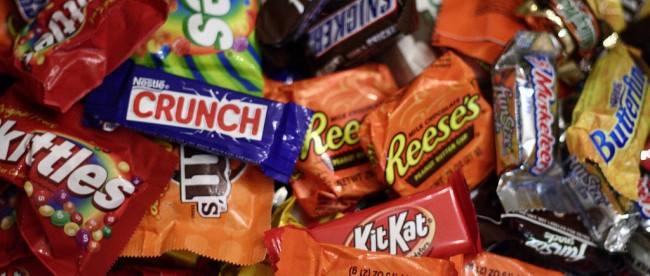Why Reese’s Are Usually Taxed But Kit Kats Aren’t
If you’re in an area which celebrates Halloween, there’s a very good chance you have a bucket of junk in your house right now which looks something like this:

And you probably have someone in your house — kids, adults, perhaps even part of your own internal monologue — which is begging you to eat some of that loot. But nutrition should come first, of course, and nothing in the picture above can remotely be considered “food,” right?
Well, those Kit Kat bars may be — depending on where you are and whether you care what the local taxing authority thinks.
When it comes to sales tax, the general rule is “tax everything.” The government typically doesn’t care what you’re buying — it needs its few cents on the dollar in order to pay for the services it provides. However, there are very sensible reasons to not levy an additional amount on things like fruits, vegetables, cheese, breads, and other groceries which make up a family’s generally necessary diet. On the other hand, when someone buys candy — say, a Reese’s Peanut Butter Cup — the state probably wants its 8% or so. So where does the state draw the line?
As NPR reported in 2010, many states define candy as “a preparation of sugar, honey or other natural or artificial sweeteners combined with chocolate, fruits, nuts or other ingredients or flavorings, and formed into bars, drops or pieces.” That’s a good definition but a pretty expansive one. And, if you think about it, it probably encapsulates a lot of things that are clearly not “candy” — including items of the muffin family and other bread-ish varieties. So the taxman adds a new rule, one that exempts items which contain flour.
Immediately, this causes a new problem. The Minnesota Department of Revenue has a fact sheet which spells out the loophole nicely (pdf):
Items that contain the word “flour,” such as white, whole wheat, rice, corn, or brown flour, as an ingredient on the label are not taxable candy. Examples of items that contain flour that are not taxable include Kit Kats, Twix, Reese-Sticks, and licorice.
So if you’re in Minnesota, your Kit Kats are going to cost you $1.00. But those Snickers, Hershey bars, or Reese’s Peanut Butter Cups? $1.00, plus 6.875% tax.
Minnesota isn’t alone, either. The NPR article notes that Colorado and Washington had similar laws as of 2010. Illinois had one as recently as 2009. North Carolina has one, too, as do a few other states. Many of those laws have been revisited, revised, or repealed, although a few still exist (including Minnesota’s). So in some places, Kit Kats and Twix are (as far as taxes are concerned) still classified as sustenance, not junk food — although you probably shouldn’t eat them for breakfast.
 Bonus Fact: In the United States, Kit Kats are produced by the Hershey Company. But that’s not true anywhere else. In the rest of the world, Kit Kats are made by Nestle, the same company that brings us the Nestle’s Crunch bar. Hershey’s license to manufacture and distribute Kit Kats in the U.S. dates to 1970 and is perpetual, but the license likely wouldn’t continue if another company acquired the Hershey Company. As Kit Kats are very popular, this has become a problem for Hershey. As the New York Times reported in 2002, when the Hershey Company tried to find an acquirer, buyers balked, as the likelihood of losing the revenue from Kit Kats made the asking price too high.
Bonus Fact: In the United States, Kit Kats are produced by the Hershey Company. But that’s not true anywhere else. In the rest of the world, Kit Kats are made by Nestle, the same company that brings us the Nestle’s Crunch bar. Hershey’s license to manufacture and distribute Kit Kats in the U.S. dates to 1970 and is perpetual, but the license likely wouldn’t continue if another company acquired the Hershey Company. As Kit Kats are very popular, this has become a problem for Hershey. As the New York Times reported in 2002, when the Hershey Company tried to find an acquirer, buyers balked, as the likelihood of losing the revenue from Kit Kats made the asking price too high.
From the Archives: Taxed Cuts: How a knife turns a bagel into a taxable event.
Take the Quiz: Here’s the slogan, name the candy.
Related: Japan has Kit Kats in all sorts of neat flavors, like green tea and wasabi. Give them a try.
Image via Flickr user adwriter, used under a Creative Commons license.
